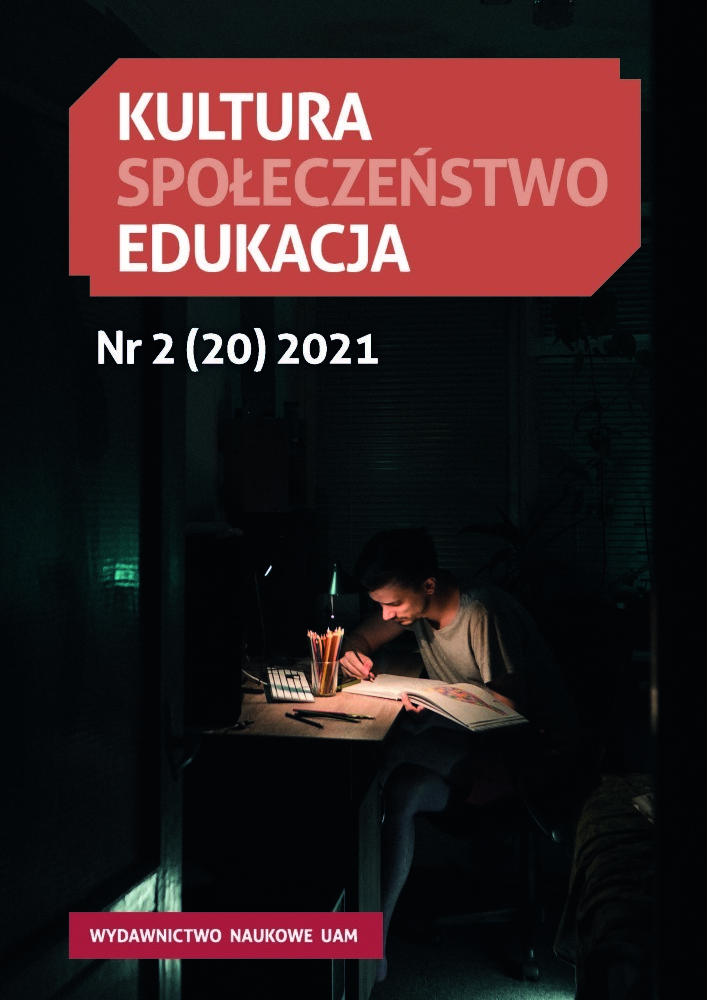Abstract
The aim of the article is to analyze the extent, to which the participation of students in learning mobility projects on the example of the Erasmus+ programme influences the improvement of their individual skills desired from the perspective of the labour market. The text begins with an introduction that outlines the background to the considerations undertaken. Next, the historical context of learning mobility in Europe and the process of internationalization of universities are presented as one of the consequences of the globalizing labour market. In the following part of the article we characterized the best known European programme promoting academic mobility Erasmus+. The end of the article contains a review of the research on the competences of beneficiaries of learning mobility projects, supported by statistical data, and an attempt to draw a link between participation in student exchange and the chances of finding a satisfactory employment after graduation. The analysis shows that graduates with foreign mobility experience develop a number of characteristics and skills, that increase their employability and career opportunities.
Literaturhinweise
Baron B. (1993), The Politics of Academic Mobility in Western Europe, Higher Education Policy, 6(3), s. 50–54.
Bracht O., Engel C., Janson K., Over A., Schomburg H., Teichler U. (2006), The Professional Value of Erasmus Mobility, Kassel, https://www.eurashe.eu/library/modernisingphe/mobility/professional/WG4%20R%20Professional%20value%20of%20ERASMUS%20mobility%20Teichler.pdf, dostęp: 23.11.2020.
Brooks R., Waters J.L. (2011), Student Mobilities, Migration and the Internationalization of Higher Education, Hampshire.
Choudaha R. (2017), Three Waves of International Student Mobility (1999–2020), Studies in Higher Education, 42(5), s. 1–8.
Communiqué of the Conference of European Ministers Responsible for Higher Education, Leuven and Louvain-la-Neuve, 28–29 April 2009, https://europa.eu/rapid/press-release_IP-09-675_en.htm, dostęp: 23.11.2020.
Council of the European Union (2012a), Council Conclusions on the Employability of Graduates from Education and Training, Brussels, http://www.consilium.europa.eu/uedocs/cms_data/docs/pressdata/en/educ/130142.pdf, dostęp: 23.11.2020.
Council of the European Union (2012b), Press Release: 3164th Council Meeting – Education, Youth,
Culture and Sport, Brussels, https://www.consilium.europa.eu/uedocs/cms_data/docs/pressdata/en/educ/130177.pdf, dostęp: 23.11.2020.
Dąbrowska-Ręsiak J. (2018), Erasmus... i co dalej? Badanie losów edukacyjnych i zawodowych polskich studentów uczestniczących w projektach mobilności w programie Erasmus, Warszawa.
Domański T. (2017), Internacjonalizacja polskich uczelni wyższych, [w:] T. Domański, A. Stępień-Kuczyńska, A. Włodarska-Frykowska (red.), Internacjonalizacja polskich ośrodków politologicznych, Łódź, s. 63–80.
European Commission (2016), A New Skills Agenda for Europe. Working Together to Strengthen Human Capital, Employability and Competitiveness, Brussels. European Commission (2017), Erasmus+ Programme Guide, version 2, https://ec.europa.eu/programmes/erasmus-plus/sites/erasmusplus2/files/erasmus-plus-programme-guide2_en.pdf, dostęp: 23.11.2020.
European Commission (2018), Employment and Social Developments in Europe, Annual Review 2018, https://ec.europa.eu/social/main.jsp?langId=en&catId=89&newsId=9150, dostęp: 23.11.2020.
Eurostat (2019), Euro Area Unemployment at 7.8%, https://ec.europa.eu/eurostat/documents/2995521/9697394/3-01042019-BP-EN.pdf/899edf8c-529b-422a-ac1a-ce0fede29fa3, dostęp: 23.11.2020.
Feyen B., Krzaklewska E. (red.) (2013), The ERASMUS Phenomenon – Symbol of a New European Generation?, Frankfurt am Main.
Gallup Organization (2011), Youth on the Move. Analytical Report, Brussels, https://ec.europa.eu/commfrontoffice/publicopinion/flash/fl_319b_en.pdf, dostęp: 23.11.2020.
Humburg M., van der Velden R., Verhagen A. (2013), The Employability of Higher Education Graduates: The Employer’s Perspective, Brussels.
Janson K., Schomburg H., Teichler U. (2009), The Professional Value of ERASMUS Mobility, Bonn.
Kelo M., Teichler U., Wächter B. (red.) (2006), EURODATA – Student Mobility in European Higher Education, Bonn.
Knight J. (1994), Internationalization: Elements and Checkpoints, CBIE Research, 7, s. 1–14.
Knight J. (2003), Updating the Definition of Internationalization, International Higher Education, 33, s. 2–3.
Komisja Europejska (2014), Badanie wpływu programu Erasmus. Wpływ mobilności na zdobywanie umiejętności i szanse zatrudnienia studentów oraz na umiędzynarodowienie instytucji szkolnictwa wyższego, Luksemburg.
Kwiatkowski S.M. (2013), Kształcenie zawodowe w formach szkolnych – wyzwania edukacyjne i gospodarcze, Debata Edukacyjna, 6, s. 17–26.
Martín P.M. (2012), The European Union Tackling Youth Unemployment in Times of Crisis, Berlin, http://library.fes.de/pdffiles/id/ipa/09516.pdf, dostęp: 23.11.2020.
OECD (2017), In-Depth Analysis of the Labour Market Relevance and Outcomes of Higher Education Systems: Analytical Framework and Country Practices Report, Enhancing Higher Education System Performance, Paris, http://www.oecd.org/education/skills-beyond-school/LMRO%20Report.pdf, dostęp: 23.11.2020.
Pachocki M. (2018), Mobilność kluczem do kariery? Raport z badania losów uczestników zagranicznych staży i praktyk zawodowych, Warszawa.
Perspektywy (2019), Ranking szkół wyższych, http://perspektywy.pl/RSW2019/tables/mrwzsalbft_RSW/pdf/RSW-2019-ranking-uczelni-akademickich.pdf, dostęp: 23.11.2020.
Quintini, G. (2011), Over-Qualified or Under-Skilled: A Review of Existing Literature, OECD Social, Employment and Migration Working Papers, No. 121, OECD Publishing.
Resolution of the Council of the European Union and the Representatives of the Governments of the Member States meeting within the Council on a framework for European cooperation in the youth field (2019), The European Union Youth Strategy 2019–2027, https://eur-lex.europa.eu/legal-content/EN/TXT/?uri=CELEX%3A42018Y1218%2801%29, dostęp: 23.11.2020.
Sloman J. (2001), Podstawy ekonomii, Warszawa.
Stiglitz J.E. (2007), Globalizacja, Warszawa.
Teichler U. (2009), Internationalisation of Higher Education: European Experiences, Asia Pacific Education Review, 10(1), s. 93–106.
Teichler U. (2017), Internationalisation Trends in Higher Education and the Changing Role of International Student Mobility, Journal of International Mobility. International mobility: brain drain, brain gain?, 5(1), s. 177–216.
Teichler U., Ferencz I., Wächter B. (red.) (2011), Mapping Mobility in European Higher Education. Volume 1: Overview and Trends, Brussels. The Bologna Declaration of 19 June 1999. Joint declaration of the European Ministers of Education, https://www.eurashe.eu/library/bologna_1999_bologna-declaration-pdf/, dostęp: 23.11.2020.
Yorke M. (2006), Employability in higher education: what it is – what it is not, The Higher Education Academy, York, https://www.qualityresearchinternational.com/esecttools/esectpubs/yorkeknightembedding.pdf, dostęp: 23.11.2020.
Zalecenie Parlamentu Europejskiego i Rady z dnia 18 grudnia 2006 r. w sprawie kompetencji kluczowych w procesie uczenia się przez całe życie, https://eur-lex.europa.eu/legal-content/PL/TXT/PDF/?uri=CELEX:32006H0962&from=EN, dostęp: 23.11.2020.
Lizenz
Copyright (c) 2021 Magdalena Zapotoczna

Dieses Werk steht unter der Lizenz Creative Commons Namensnennung - Keine Bearbeitungen 4.0 International.

